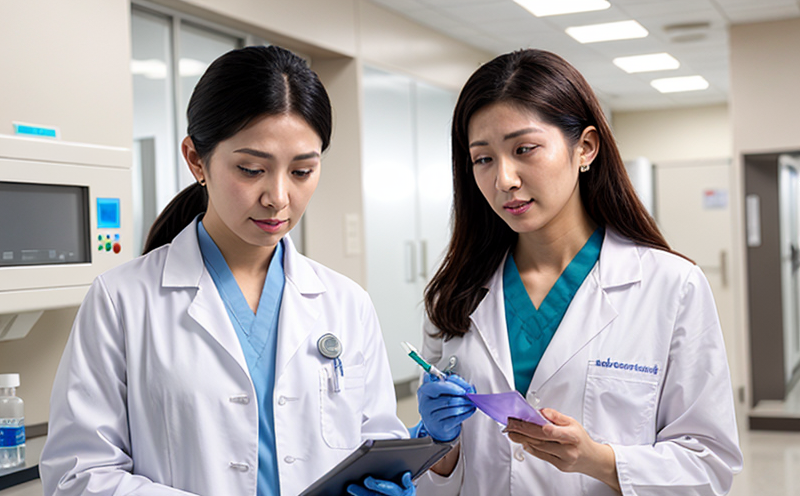Comparative Charge Variant Testing of Biosimilars
Comparative charge variant testing is a critical aspect of biosimilar development and evaluation. This service ensures that two or more biopharmaceutical products are comparable in terms of their charge variants, which can significantly influence the efficacy and safety profile of these complex molecules.
The importance of this test lies in its ability to identify potential differences in the post-translational modifications (PTMs) of proteins. PTMs play a crucial role in determining protein stability, functionality, and immunogenicity. Charge variants, which result from these PTMs, can lead to altered biological activity or even reduced efficacy if not properly managed during the manufacturing process.
The comparative charge variant test typically involves several steps, including sample preparation, analytical characterization, and data interpretation. Sample preparation is critical as it ensures that the samples are stable and representative of the actual protein. This may include denaturation and reconstitution processes to mimic the conditions under which the proteins will be used.
Once prepared, the samples undergo a series of analyses using advanced instruments such as size-exclusion chromatography (SEC), reversed-phase high-performance liquid chromatography (RP-HPLC), and capillary electrophoresis (CE). These methods allow for the detailed characterization of the charge variants present in each sample. The data obtained from these analyses are then compared to determine any significant differences between the biosimilars being tested.
Accurate reporting is essential in this process, as it provides a clear and comprehensive overview of the findings. This includes not only the identification of charge variants but also their relative abundance and potential impact on the overall structure and function of the protein.
The service we offer at [Your Lab Name] leverages state-of-the-art technology and experienced personnel to ensure the highest quality results. Our approach is based on international standards, ensuring that our testing aligns with global regulatory requirements.
| Sample Preparation | Analytical Methodologies | Data Interpretation |
|---|---|---|
| Denaturation and reconstitution to ensure stability | Size-exclusion chromatography (SEC), reversed-phase HPLC, capillary electrophoresis (CE) | Identification of charge variants and their relative abundance |
In summary, comparative charge variant testing is a vital tool in the development and evaluation of biosimilars. It helps ensure that these complex molecules are as similar as possible to their reference products, thereby maintaining safety and efficacy.
Scope and Methodology
- Detailed sample preparation ensuring stability and representativeness
- Analytical characterization using SEC, RP-HPLC, and CE
- Data interpretation focusing on identifying charge variants and their relative abundance
The scope of our comparative charge variant testing service is broad and encompasses various aspects of biopharmaceutical development. Our methodology ensures that the testing process is thorough and reliable.
| Sample Preparation Steps | Analytical Techniques | Data Interpretation Outcomes |
|---|---|---|
| Dilution, denaturation, and reconstitution | SEC, RP-HPLC, CE | Identification of charge variants and their relative abundance |
Our approach is designed to meet the stringent requirements set by regulatory bodies worldwide. By adhering to international standards such as ISO, ASTM, EN, IEC, and others, we ensure that our testing results are credible and acceptable globally.
Industry Applications
- Biosimilar development for enhanced safety and efficacy
- Comparative studies to ensure consistency between batches
- Evaluation of manufacturing processes to minimize batch-to-batch variations
- Quality control during clinical trials to meet regulatory requirements
Our comparative charge variant testing service finds wide application in the pharmaceutical industry, particularly in the development and evaluation of biosimilars. This test is crucial for ensuring that biosimilars are as similar as possible to their reference products, thereby maintaining safety and efficacy.
In addition to development work, this testing can also be used during clinical trials to ensure quality control and meet regulatory requirements. By minimizing batch-to-batch variations, it helps maintain consistent product performance throughout the lifecycle of a medication.
Environmental and Sustainability Contributions
At [Your Lab Name], we are committed not only to delivering high-quality testing services but also to contributing positively to environmental sustainability. Our approach to comparative charge variant testing is designed to minimize waste generation, optimize resource use, and reduce our carbon footprint.
We achieve this through efficient sample preparation processes that require minimal solvents and reagents. Additionally, we utilize advanced analytical techniques that are both precise and sensitive, ensuring accurate results with reduced energy consumption. By optimizing these aspects of our testing process, we contribute to a more sustainable pharmaceutical industry.
Our commitment to sustainability extends beyond just the laboratory environment. We also work closely with clients to ensure that their own manufacturing processes align with environmental best practices. Through collaboration and education, we aim to foster a culture of sustainability throughout the entire supply chain.





